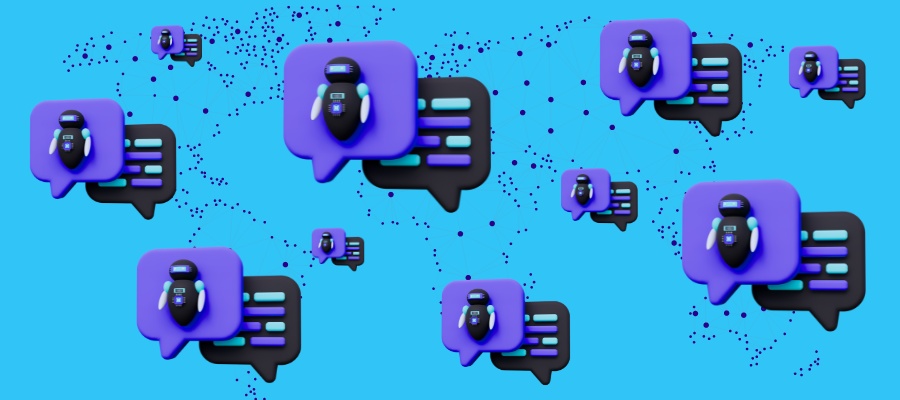/AI%20BOTS%20IN%20POWER%20GOVERNANCE.jpg)
AI governance in governments: Chatbots in positions of power

Kani Talabani
Nation states worldwide are embracing advancements in chatbot technology to streamline governmental and public operations. Are the public benefitting?
Governments around the world are continuing to jump on the AI bandwagon, eager to harness its many capabilities. There is a growing sentiment among experts that instead of solely focusing on regulatory measures, governments should actively leverage AI to enhance operational efficiency.
In recent years, significant milestones have marked this shift in the adoption of AI. The European Union's endorsement of AI governance regulations, the proliferation of generative AI, and the escalating debate surrounding AI deep fakes all underscore the rapid evolution of our approach to global AI governance. Amidst this landscape, AI chatbots have emerged as pioneer solutions, finding their way into nations such as the US, UK, and UAE, among others.
But how do these nations diverge in their approaches to global AI governance? Delve into the varying ways different countries are using AI chatbots and their unique perspectives on integrating AI into governmental and public sectors.
Global AI governance 🌐
- UK: Redbox Copilot
- US: Emma
- UAE: U-Ask
- Egypt: KMT
- Estonia: Kratt
- Russia: Gigachat
- Mexico: CAVINAI
- Singapore: OneService
- Albania: Virtual Assistant 1.0
- Greece: mAigov

UK: Redbox Copilot
Approved and released in January 2023 after a series of testing and prototyping by the UK Government’s No 10 Innovation Fellowship and Evidence House teams, the Redbox Copilot was officially launched and introduced to the Cabinet Office. Based on the traditional ministerial red box carried by Government ministers in the UK parliament, the Redbox Copilot is designed to chat with ministers and summarise civil service documents. Other features include: Robust Retrieval Augment Generation (RAG), guided summarisation, advanced prompting techniques, proactive data privacy and retention, securely designed for on-premise and cloud deployment.
US: Emma
Fluent in both English and Spanish, and inspired by the person behind the poem inscribed on the Statue of Liberty, Emma Lazarus, US Citizenship and Immigration Services introduced Emma to the world. The virtual assistant offers users any information related to immigration services and helps navigate the website. A White House press release by their Principal Deputy U.S. Chief Technology Officer Deirdre K. Mulligan and U.S. Digital Service Administrator Mina Hsiang stated: “The U.S. Government is already using AI to benefit the public across its vast mission areas to include tackling global challenges such as climate change and cancer.”
UAE: U-Ask
In May 2033, the UAE launched the government AI chatbot ‘U-Ask’. Created using generative AI technology, the chatbot gives users information in both Arabic and English and takes them to relevant government services and applications. On their official website, the UAE stated that their adoption of proactive digital services “reflects a collaborative effort among government entities, aligned with the UAE’s vision of achieving a 100 percent digital government.”
Egypt: KMT
In February 2024, Cairo announced the launch of an artificial intelligence-based service named ‘KMT’, which is described as the first ever AI chatbot to be used in the Egyptian government. The main role of the AI chatbot is to answer queries related to civil service legislation and executive regulations. Director of the Mission of the United States Agency for International Development (USAID) in Egypt, Shawn Jones, stated that the launch was: “A model of what our strong partnership can achieve. KMT showcases some of the greatest promises of digital transformation in Egypt, including increased access to information and communication without barriers.”
Estonia: Kratt
No, we don’t mean the mythical creature from Estonian folklore. In July 2019, the Estonian government adopted the ‘Kratt strategy’ pledging to invest up to 10 million euros on AI development within the government. Kratt, short for Bürokratt, is an virtual assistant user interface powered by AI. There is another AI strategy in the works, and the government website boasts the AI chatbot’s potential to “increase the productivity of our economy and take public services to a new level.” Recognised as one of the most digitally advanced governments in the world, Estonia ranked third in the Digital Economy and Society Index 2023 (DESI) for digital public services.
Russia: Gigachat
Sberbank, owned by The Ministry of Finance of Russia, announced in April 2023 the release of what others have named the “rival to ChatGPT”: Gigachat. The AI chatbot, much like ChatGPT, is able to generate both text and images and is described as a multimodal tool. Sberbank’s Chairman of the Board stated in a press release: “Sber's new development, which we presented today, is a breakthrough for the entire large universe of Russian technologies. Moreover, GigaChat is unique in its open architecture, while global analogues of our model adhere to the Closed AI course.”
Mexico: CAVINAI
The Mexican government, with the help of autonomous body The National Institute of Transparency, Access to Information, and Protection of Personal Data (INAI), launched their AI-powered chatbot CAVINAI, powered by REVE Chat. Through this virtual assistant, the Mexican government aims to give the public better access to public information and protect their personal data. REVE Chat’s CEO, Rezaul Hassan, stated: “Modern organisations are now using smart AI-enabled chatbots to communicate with their audiences. Government organisations are not an exception.”
Singapore: OneService
Launched in July 2021, the OneService chatbot allows users to report any issues related to this area via WhatsApp or Telegram. OneService is part of the government’s National Artificial Intelligence Strategy (NAIS), in a bid to implement and deploy improved AI solutions for citizens. The chatbot is more commonly used on social platforms for ease of access for residents reporting any issues, rather than having to download the OneService application. In 2023, Singapore launched their National AI Strategy 2.0 (NAIS 2.0). Commenting on the new strategy, Deputy Prime Minister and Minister for Finance, Lawrence Wong, said: “It outlines our vision for Singapore to be a place where AI serves as a force for good, and where we harness AI to uplift and empower our people and businesses.”
Albania: Virtual Assistant 1.0
In December 2023, the National Agency of IT in Albania, AKSHI, and Microsoft Azure’s OpenAI teamed up to create the AI chatbot Virtual Assistant 1.0. The aim of the chatbot is to help users navigate the e-Albania digital governance portal, which offers public services for citizens 24/7, ranging from accessing records to downloading legal documents. The government of Albania has also promised that later this year, a voice- and image-activated chatbot, the Virtual Assistant 2.0, will be ready to use. After presenting the country’s plans for digital and AI transformation in 2030, Albania’s Director of the National Agency of Information Society, Linda Karcanaj, said in a LinkedIn post: “Albania will soon start the wide use of Artificial Intelligence, bringing a fundamental change in our lives. The new technology will enable proactive services, voice assistance for any public service and ease of application.”
Greece: mAgiov
The Greek government launched the country’s first digital AI chatbot, dubbed mAgiov, in December 2023. Greek citizens can engage with the mAgiov ai chatbot through their mobile phones, laptops and other devices. Still in beta-mode, the aim of the chatbot is to allow better ease of access for those less technologically literate through the government website, Gov.gr, in order to access services related to areas such as business activities, property and agriculture. Earlier this year the Greek Ministry of Foreign Affairs and Ministry of Digital Governance announced the multilingual languages update, boasting 25 languages in total. Commenting on the country’s stance on AI, an official whitepaper on Democratising AI: A National Strategy for Greece stated: “Greece aims to Democratise AI, by placing it at the service of people, society and the environment, and by infusing AI with the principles of Democracy.”
Want to find out more about AI in the C-suite? Check out our selection of articles and thought leadership on AI governance, regulations, ethics and more.
SUBMIT A COMMENT
RELATED ARTICLES
Join the community
To join the HotTopics Community and gain access to our exclusive content, events and networking opportunities simply fill in the form below.